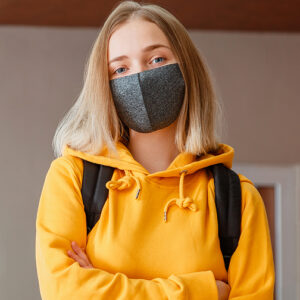The North Penn School Board voted 9-0 Thursday night to adopt a health and safety plan that includes masking protocols for the district’s nearly 13,000 students.
Masks will be required indoors for all elementary students and optional outdoors, unless the number of COVID cases in the district rise to 100 cases per 100,000 residents. If that occurs, masks will be required outdoors as well.
The indoor protocol for secondary students makes masks optional unless the number of COVID cases rises to 50 cases per 100,000 population; if that happens they would become mandatory. The outdoor protocol for secondary students is identical to the elementary protocol.
The protocols will apply regardless of a student’s vaccination status.
Teachers who are fully vaccinated will have the option of instructing without a mask while presenting material in front of their classes, provided they maintain social distancing.
Masks will be required on all district school busses per a directive from the Center for Disease Control.
The Montgomery County Office of Public Health is recommending universal indoor masking for all teachers, staff, students, and visitors to schools, regardless of vaccination status or school district level of community transmission. The final decision is left to individual school districts. But Francis Collins, director of the National Institutes of Health, said earlier this week that masking protocols are based on anecdotal information.
As of Wednesday, the number of COVID cases within the municipalities encompassing the North Penn School District stood at 61 per 100,000 population, as determined by the MCOPH. If the number stands at 50 or higher as of next week (for the second week in a row), the district would be listed in the Substantial category and more restrictive masking requirements would take effect.
The school year begins for students on Monday, August 30.
The final vote followed just under two hours of public comments from district residents that saw mask proponents stress the need to protect the health of district students, faculty, and staff, while opponents spoke to the topic of the right to make health decisions for their children and the impact of masks on the educational process.
Speakers were limited to two minutes each and Board President Tina Stoll strictly enforced that limit.
Upper Gwynedd Township resident Trish Simpson supports masking. “Until all children can be vaccinated, this is one of the few things that can be done to protect them from COVID-19,” she said.
Joanne Cunningham supports the right of parents to make masking decisions for their children. Cunningham is a reading specialist by profession.
“Masking is not natural,” she said, “and it impedes a child’s development and the ability to learn to read, a fundamental skill needed to succeed in all other core subjects.”
Mask opponents have questioned how effective they actually are in preventing the disease, especially in children, and argue the data that encourages mask use is inconclusive. In many European countries, children are not required to wear masks and that policy has had little effect on the infection rate.
A Manhattan Institute analysis found that “of the 14 randomized control trials that have tested the effectiveness of masks in preventing the transmission of respiratory viruses, three suggest, but do not provide any statistically significant evidence in intention-to-treat analysis, that masks might be useful. The other 11 suggest that masks are either useless—whether compared with no masks or because they appear not to add to good hand hygiene alone—or actually counterproductive.”
The Association of Schools of Public Health in the European Region (ASPHER) and the European Academy of Pediatrics note that psychological factors come into play when children are masked.
For children, masks represent a relevant psychological dimension that, unlike adults, must be understood in a two-fold approach (physical and psychological). It is important to consider the issues related both to the masks used by children and by adults with which they live. The recognition of family members and other close loved ones is largely based on facial traits. In very young children (under 4 years old) fear is often verified toward the person wearing a mask. Training is needed for people wearing masks who have close contact with children. For example, it is helpful to play with the child by successively putting on and taking off the mask, thus turning learning into a child’s play.
The North Penn School Board’s decision was in line with those of other local districts, all of which are determining how to deal with masking issues as the start of the new school year approaches.
In Montgomery County, the Cheltenham School District is mandating masks for students and staff regardless of vaccination status. The same standard has been adopted in the Norristown Area, Abington, and Lower Merion school districts.
The Hatboro-Horsham School District’s mask policy states that students will be masked while indoors.
The Great Valley School District in eastern Chester County has decreed that students, staff, and visitors must be masked when inside district buildings.
Elsewhere the West Chester School District has made masks optional for its nearly 12,000 students.
On July 28, the Central Bucks school board made masks optional but stipulated the policy is subject to revision if circumstances change. This past Tuesday, the Bucks County Health Department reversed its previous stance and recommended that all students in the county be masked.

